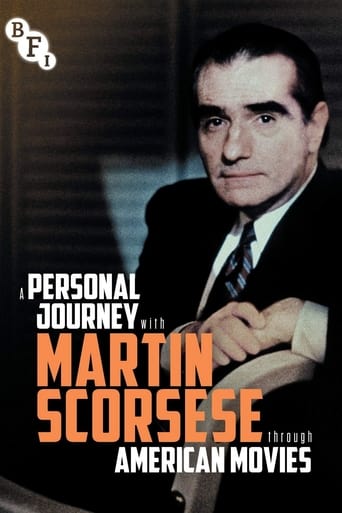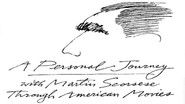gridoon2018
Martin Scorsese takes us on a journey through the history of American movies, roughly from the early silents to the late 1960s, though there are a few more recent pictures discussed as well. He does this with wisdom and insight, in a calm, soothing voice. Along the way, you get to relive some famous scenes from well-known movies, as well as discover films you had probably never even heard of. Of course any viewer might complain that their favorite movies are missing, but hey, that's why it says "personal" journey on the title, Scorsese makes it clear that he wants to focus on the films that influenced him and shaped him the most. One negative about this documentary: too many spoilers!! Otherwise, recommended to film buffs - when they have 3+ hours to spare. *** out of 4.
jzappa
Prolific and highly influential filmmaker Martin Scorsese examines a selection of his favorite American films grouped according to three different types of directors: the director as an illusionist: D.W. Griffith or F. W. Murnau, who created new editing techniques among other changes that made the appearance of sound and color later step forward; the director as a smuggler: filmmakers such as Douglas Sirk, Samuel Fuller, and mostly Vincente Minnelli, directors who used to disguise rebellious messages in their films; and the director as iconoclast: those filmmakers attacking civil observations and social hang-ups like Orson Welles, Erich von Stroheim, Charles Chaplin, Nicholas Ray, Stanley Kubrick, and Arthur Penn.He shows us how the old studio system in Hollywood was, though oppressive, the way in which film directors found themselves progressing the medium because of how they were bound by political and financial limitations. During his clips from the movies he shows us, we not only discover films we've never seen before that pique our interest but we also are made to see what he sees. He evaluate his stylistic sensibilities along with the directors of the sequences themselves.The idea of a film canon has been reputed as snobbish, hence some movie fans and critics favor to just make "lists." However, canon merely denotes "the best" and supporters of film canon argue that it is a valuable activity to identify and experience a select compilation of the "best" films, a lot like a greatest hits tape, if just as a beginning direction for film students. All in all, one's experience has shown that all writing about film, including reviews, function to construct a film canon. Some film canons can definitely be elitist, but others can be "populist." As an example, the Internet Movie Database's Top 250 Movies list includes many films included on several "elitist" film canons but also features recent Hollywood blockbusters at which many film "elitists" scoff, like The Dark Knight, which presently mingles in the top ten amidst the first two Godfather films, Schindler's List and One Flew Over the Cuckoo's Nest, and the fluctuation of similar productions further down such as Iron Man, Sin City, Die Hard, The Terminator and Kill Bill: Vol. 2. Writer Scorsese's Taxi Driver Paul Schrader has straightforwardly referred to his canon as "elitist" and contends that this is positive.Scorsese is never particularly vocal at all about his social and political ideologies, but when we see this intense and admittedly obsessive history lesson on the birth and growth of American cinema in both ideological realms, we see that there is really no particular virtue in either elitism or populism. Elitism concentrates all attention, recognition and thus power on those deemed outstanding. That discrimination could easily lead to self-indulgence much in the vein of the condescending work of Jean-Luc Godard or the overrationalization of the production practices of a filmmaker like Michael Haneke. Yet populism invokes a belief of representative freedom as being only the assertion of the people's will. As has been previously asserted about the all-encompassing misconceptions the people have about cinema, populism could be the end of the potential power and impact of cinema. One can only continue seeing films, because it is a vital social and metaphysical practice. And that's what Martin Scorsese spends nearly four hours here trying to tell us, something which can't be told without being seen first-hand.
dcousquer
I would never have thought I would almost cry viewing one minute excerpted from a 1920 black and white movie without sound. Thanks to Martin Scorsese I did (the movie was from F. Borzage). You will start to understand (if it's not already the case), what makes a good movie.
MisterWhiplash
This documentary was interesting, but it was also long (so long it lasts a total of 225 minutes), like Ben-Hur long. But if your into that, this is for you. But only if you have a passion for movies, like I do. Being that Martin Scorsese is my favorite director (live and maybe even ever), this is quite fascinating, especially if you know the style of Scorsese's works. Because then you can understand where he got his inspiration for many of his films. Not the best documentary film ever made, but it is a leap for Scorsese, which is always good to watch. A



